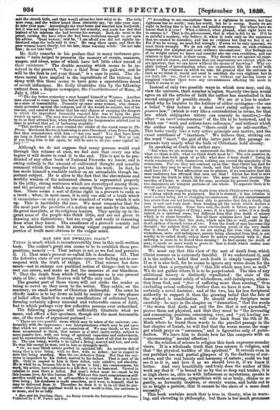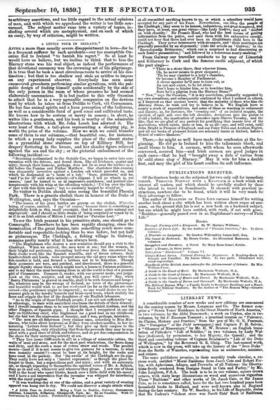ILAN AND HIS Dinia.1DM PLACE. * THERE is much which is
incontrovertibly true in this well-written book. The author's great aim seems to be to establish these pro- positions, namely :—I. That nature is not as we feel and perceive it. II. That man's present so-called life is deadness. III. That the defective state of our perceptions causes our feeling not to cor- respond with the truth of things. IV. That science has done much—not to enlarge our purblind notion of things—but to cor- rect our errors, and make us feel the measure of our blindness. V. That the death from which Christ redeems us is our present state of life ; and that Heaven will bd'the only real life.
The greater part of these views will not strike the reader as being so novel as they seem to the writer. They sublie, on the contrary, no small section of Christian philosophy. The error he chiefly makes is to lay down as held by society one or two phases of belief often limited to sundry ramifications of collateral tenet, forming certainly a [very unsound and vulnerable canon of faith, but to which perhaps very few reflective persons ever subscribed.
The following passages will sufficiently illustrate what we mean, and afford a fair specimen, though not the most favourable one' of the mode of argument pursued :— "There are two possible views which may be taken of the universe' con- formably with the appearance : two interpretations which may be put upon that which we perceive and are conscious of. We may think, as we have been accustomed to think, that nature is a* dead inertj entity, subject to mere passive law, with one being. of spiritual capacities and endowments, and he mysteriously failing, sinning, evil, falling short of all that he should be. The one being, worthy to be called a Being, marred and lost, and evil. No tree life except in man, and in him so strangely spoilt. "Or we may think nature perfect in spiritual life. An universe full of being that is true being, with no flaw, with no defect ; but in respect to man this being wanting. Man the one defective thing. Not that the uni- verse is imperfect by his defect, marred by his failure. That is part of its life. Only in respect to him is there defect, only relative, not absolute. He is what he is, because life is to be given to him; his consciousness, his work, his action, have reference to a life that is to be bestowed. Viewed in relation to man there is defect. But man's defect must be—must be for this human love, for this human life. Without this inert consciousness self- sacrifice could not be and in self-sacrifice is creature life. Man is to have true being j Ms deadness is made conscious, as it were, to himself, that he may be delivered from it. Therefore he feels it to be in all that he per- ceives—therefore the spiritual world is a dead world to him, the universe is so mein; and he so lofty.
• Man and his Doeettisig Place. An Essay towards the Interpretation of Nature. Published by J. W. Parker and Son.
According to our conceptions there is a rightness in nature, but that rightness has no worth ; man has worth, but he is wrong. Surely we are
right in feeling this to be a dark and painful mystery. But where have we learnt that it is true ? What evidence, what ground, what right have we to assume it ? That is the phenomenon, that is whatis felt by tut. If it be so painful a mystery, why believe it, when it reds only on the assurance that we cannot be mistaken, and has no evidence but that we feel it so ?
For if we be wrong, we must feel wrongly ; if even we be only ignorant, we must think wrongly. We do not rely an such reasons, on such evidence
respecting the simplest and most ordinary circumstance. Our feelings are of no weight unless we know and consider also our own condition, and our relation to that which is their cause. Why should we act against all expe- rience and all reason, and assume that our impressions are correct while we are ignorant, that we can know without the means of knowing ? Why ex- plain instead of investigating when our explanation fills the world with gloom ? The evidence on which we take for granted that the universe is such as we think it, would not avail to establish the very slightest fact in our daily life : viz., that it seems so to us, without our having learnt or imagined whether there were any circumstances affecting the mode in which it seems to us."
Instead of only two possible ways in which men may, and do, view the universe their number is legion. Scarcely two men would agree on all the articles of faith the author has marshalled in his second category of possible creeds. We are at a loss to under- stand why he imputes to the holders of either syntagma—the one a belief "that nature is a dead inert entity subject to mere pauire law," (which is very like a contradiction in terms, for that law which subjugates nature can scarcely be inactive,)—the other "an inert consciousness" of the life to be bestowed, and to which our "work and actions have reference," and without which the author roundly asserts, "there could be no self-sacrifice." This looks vastly like a very active principle and motive, and the exact antithesis of "inertness." We believe that, striking out the word "inert," the gist of the latter part of this passage re- presents very nearly what the bulk of Christians hold already.
In speaking of death the author says :
"But when we are seeking to understand the Bible, what does it matter what we think is life, what we think death must be ? The sole question is, what does that book speak of as life, what does it term death ? Using its words consistently with themselves, nothing can exceed the simplicity of its statements. For are they not summed up in this: that Christ has died for men that they may be saved from death, and that believing in Him they shall have life ? What affirmation can be plainer, if we remember that the same testimony has affirmed that men are dead ? Christ has died to save men from the death in which they are. The same men that proclaim the sacrifice of Christ, to obtain life for man, proclaim his present death. The two statements are integral portions of one whole. To separate them is to distort and to destroy. "We have been regarding the death from which Christ saves as temporal, as a thing which may be postponed. But it is eternal ; it has relation to man's actual being, not to changing circumstances. All our embarrassment has arisen from our not having been able to perceive that this is death, that man is now and truly dead : from bending all the words which declare it into another meaning. Some have said, the death is future, man is con- demned to die, in danger of dying ; some, it is a figure; ome, it is a death indeed, in a spiritual sense, but different from that due death of misery which is to ensue hereafter. But all these opinions have had one basis: inability to believe that this state, which men like so well, could be the death spoken of in such terms of awe. From the death of man has come this thought ; the saddest fruit, the most convincing proof, of the very death that is denied. For what is it we are saying, but even this' that mere wickedness, mere self-indulgence, merely being alienated from God, is not worthy to be called death, unleas there be misery conjoined with it ; that suffering is more to be feared than sinning ? In that speaks the death of man, it needs no more words to prove it : that is death which makes man fear suffering more than sinning. '
We must say that this view of the sort of death from which Christ rescues us is extremely fanciful. If we understand it, and it is the author's belief that such death is simply temporal life. If so it is also hell, for he seems to ignore any worse doom for the wicked than a perpetuity of "this life which men love so well." We do not gather where it is to be perpetuated. The idea of any additional misery is distinctly repudiated : the state of the damned is to consist solely of wickedness, self-indulgence, aliena- tion from God, and "fear of suffering more than sinning," thns excluding actual suffering further than we have it now. This is certainly a novel doctrine; and of the two, has far less Scriptural authority to support it than the growing belief that the fate of the wicked is annihilation. He should study, Scripture more carefully : he says in the chapter on " damnation, ' that the words "the worm that dieth not and the fire that is not quenched," proves them not physical, and that they must be "the devouring and consuming passions, consuming ever, and "yet leaving un- concerned." If the author will refer back from the 9th of St. Mark where he found these words to the parallel passage in the last chapter of Isaiah, he will find that the worm means the mag- got which preys on "carcasses," and is figurative only of putre- faction. We leave him to decide how far this comports with an " unconsuming" mental affection ! On the relation of science to religion this book expresses sounder views. It is a wholesale truth that true science is religion, and that "the physical testifies of the spiritual." It reveals even in our purblind use and partial glimpses of it, the darkness of our- selves, and the real beauty and harmony of nature ; could we but see it as it is, and love it as we should love it, if we knew it better. And very beautifully and truly does the author of this work say that it " is bound to us by ties so deep and tender, it is so high above us, stirs us with influences so mysterious, speaks to us in words SO moving, sympathizes with us go troy, chides us so gently, so fervently inspires, or sternly warns, and holds out to us so bright a pattern, that it cannot be the slave of a mere dead necessity." This book contains much that is true in theory, wise in warn- ing, and elevating in philosophy, but there is too much proneness
to arbitrary assertions, and too little regard to the actual opinions of men, and with which we apprehend the writer is too little con- versant. The subject matter runs into a variety of topics, in- cluding several which are metaphysical, anti on each of which an essay, by way of criticism, might he written.



























 Previous page
Previous page